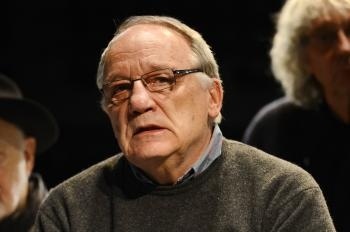about the production
Rozner’s prose attracted big attention right after its publication. It came out in 2009, with a break of thirty years after it had been written and immediately became the Book of the Year and one of the key works of Slovak literature. It also gave a phenomenal evidence of the life of artists and intellectuals in the second half of the 20th century.
The idea to put the dramatized version of this prose on stage in Martin – the city where the story reached its culmination in the National Cemetry is, to my mind, one of the most significant dramaturgical deeds at the present time. The author of the play Peter Pavlac did not focus only on the historical and political connections in the life of the banned translator Zora Jesenská, but had, in the first place, perfectly grasped the sensitivity and familiarity of Rozner’s narrative, as if he himself had re- lived the story once again. It was processed and presented to the director in a compact, modern, dramaturgical form. In the minimalistic director’s and set designer’s concept Oľhová, Heriban, Kožuch and Jašková, the unfailing first division Martin actors who are not worn out yet, are able to fill in the small space of the Martin studio with authentic and sensitive acting. Incidentally, the play is not a stunning, exceptional theatrical or visual act, but is rather aimed, mainly, at spectators who
are good listeners and can themselves put together the historical jigsaw puzzle of an individual’s and society’s guilt and innocence from the crimes and absurdities of the past regime.
Marián Amsler
“The staging recasts the story into the words of the main protagonist Zora Jesenská, whose figure accompanies us throughout the whole happening. She succumbed to leukemia at the worst time of the „normalisation“ period, when, being unemployed, she had almost lost any sense of life. (...) The author of the staging made every sensitive effort to extract the juice from the story. He did not force himself into dialogues, they came about themselves naturally, although it was, undoubtedly, a very demanding reconstruction of the text. He preserved its literary qualities and the bookish origin of the text is recognized also in the direction. The authors have slightly shifted the story by the element of Rozner’s emigration by means of introducing an authentic letter addressed to Ladislav Mňačko. In principle, director Vajdička did not go for any big staging experiments, which, in this case, was an asset. What he achieved was a play that is an independent piece able to communicate in a civil, poetic but, particularly, theatrical manner.”
Eva Andrejčáková, SME, June 2012
“The husband of the translator Zora Jesenská, who himself had been a publicist and translator, did not hesitate to unfold the most private corners of an intellectual’s soul and mind. A man struggling with the system he had once believed in, whose disenchantment had shifted him among the cumbersome and unacceptable of the contemporary regime and society.
The author of the staging Peter Pavlac went for a very humble approach when handling with Rozner’s novel. There is no undue dramatisation, comment, speculation, in other words he is not trying to „improve“ the author. He selected the situations which are, at the fi glance, just an epical record of a specific event, but do not imply an individual’s conflict with the times, the environment, friends and all the others. Thus, he offers specific dramatical moments to the staging team.
Rozner’s novel is a suggestive record of the times and its people. Vajdička’s interpretation also offers a suggestive theatre making an impact on the viewer with unobtrusive parallels of the universality of this exceptional piece of prose.”
Oleg Dlouhý, Pravda, May 2012
creators
directed by Ľubomír Vajdička
dramaturgy: Róbert Mankovecký
set design: Jozef Ciller
costumes: Marija Havran
music: Peter Mankovecký
characters and cast: Zora: Jana Oľhová; Ján: Dano Heriban; Ján senior: Ján Kožuch; Woman: Lucia Jašková
director

Ľubomír Vajdička (1944) graduated from theory of the performing arts at the Academy of Performing Arts, where he is currently active as a professor at the Department of Direction and Dramaturgy. Between 1968 and 1983 he worked in the Slovak Chamber Theatre in Martin, where, together with the set designer Jozef Ciller, he put on stage a number of plays based on Slovak and Russian classics. What followed was the engagement in the National Drama Theatre in Prague, National Theatre in Brno and the Slovak National Drama Theatre in Bratislava. He was hosted by other Czech and Slovak playhouses. In addition to theatre, he has done a number of TV plays.
He has translated the following plays from French and Russian: Ionesco (The Bald Singer, Chairs), Feydeau (A Flea in Her Ear, The Fall Guy), Marivaux (The False Servant), Musset (Lorenzaccio), Gogol (Marriage), Turgenev (A Month in the Country), Chekhov (Ivanov, The Seagull). He published a theoretical analysis of his productions of Chekhov, Ostrovsky and Gorky in the book Space – Meaning – Interpretation (Tália-Press, 1996).
